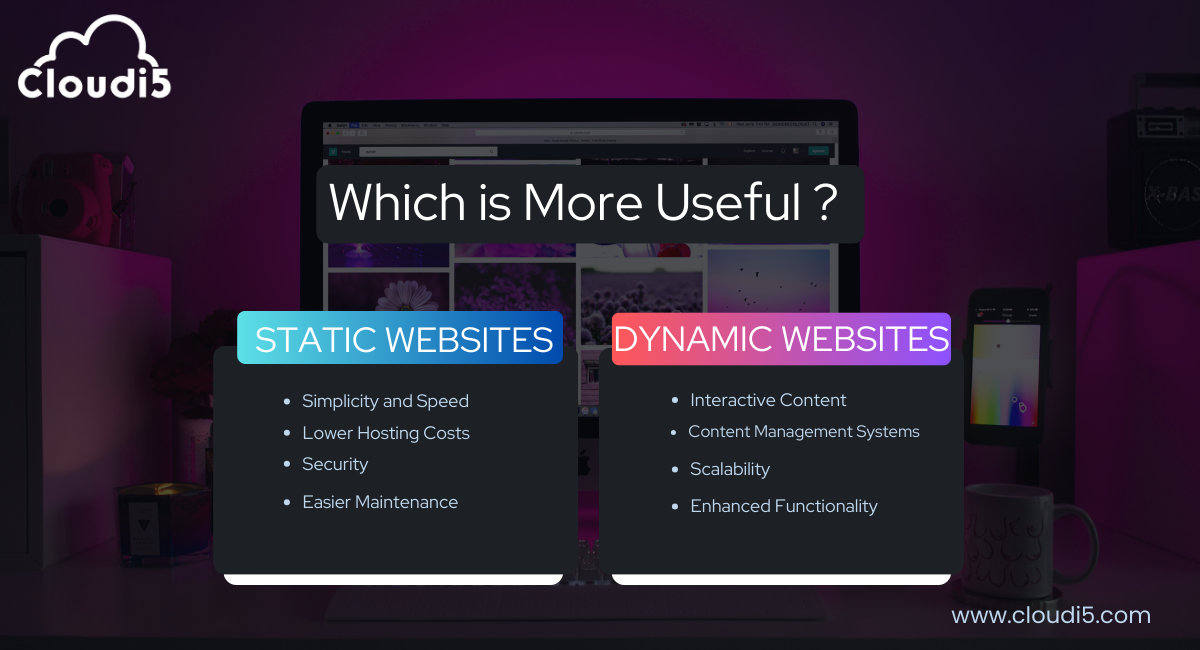
Static Websites Vs Dynamic Websites In 2025
Introduction
Websites are important for how people and businesses connect online. Knowing the difference between static websites vs dynamic websites in 2025 can help you choose the right type for your needs, especially as technology changes.
Overview of Static and Dynamic Websites
Static websites show the same content every time someone visits. They are simple and built with HTML and CSS, making them great for things like portfolios or basic information sites.
Dynamic websites change the content based on user actions or other factors. They use programming languages like PHP or JavaScript to create personalized experiences, making them ideal for e-commerce sites, social media, and blogs.
Importance of the Comparison in 2025
Choosing between static websites vs dynamic websites 2025 is important because of new technologies and what users expect. Knowing the pros and cons of each type helps businesses create better websites that load quickly, are secure, and provide a good user experience. This comparison will guide you in selecting the best option for your project.
What Are Static Websites?
Definition and Characteristics
Static websites are websites that display the same content to every visitor. They are created using simple HTML and CSS code, meaning the information is fixed and does not change unless a developer manually updates it. Static websites are typically fast and easy to host because they don’t require complex server processing.
Characteristics of Static Websites:
- Fixed Content: The same information is shown every time a user visits.
- Simple Design: They often have straightforward layouts and designs.
- No User Interaction: Users can view the content but cannot interact with it to change what they see.
Advantages of Static Websites
- Speed: Static websites load quickly because they deliver fixed content without needing to process data from a server.
- Cost-Effective: They are cheaper to build and host, making them a good option for small projects or personal sites.
- Security: With no databases or server-side scripts, static websites are less vulnerable to security threats.
- Easy Maintenance: Updating content is simple—just edit the HTML or CSS files without needing complex systems.
In the context of static websites vs dynamic websites in 2025, static websites are ideal for straightforward projects where speed, cost, and security are priorities.
What Are Dynamic Websites?
Definition and Characteristics
Dynamic websites are websites that can change content based on user interactions or other factors. They use programming languages like PHP, ASP, or JavaScript to create personalized experiences. Unlike static websites, dynamic sites can display different information to different users, making them more interactive.
Characteristics of Dynamic Websites:
- Changing Content: The information can vary for each visitor, based on their actions or preferences.
- User Interaction: Users can interact with the site, such as filling out forms or making purchases.
- Complex Structure: They require a server and often use databases to store and retrieve information.
Advantages of Dynamic Websites
- Personalization: Dynamic websites can tailor content to individual users, providing a more engaging experience.
- Interactivity: Users can interact with the site, such as leaving comments, signing up for newsletters, or shopping online.
- Scalability: They can handle larger amounts of content and users, making them suitable for complex applications.
- Content Management: Dynamic sites often use Content Management Systems (CMS) that allow easy updates and management of content without needing to code.
In the context of static websites vs dynamic websites in 2025, dynamic websites are ideal for projects where user engagement and personalized experiences are essential.
Key Differences Between Static and Dynamic Websites
Performance and Speed
- Static Websites load quickly because they serve fixed content directly from the server, with no processing needed.
- Dynamic Websites may take longer to load since they generate content on-the-fly, requiring more server processing.
Cost Considerations
- Static Websites are usually cheaper to build and host because they require less complex technology.
- Dynamic Websites can be more expensive due to the need for databases, server-side programming, and ongoing maintenance.
Security Aspects
- Static Websites are generally more secure because they don’t rely on databases or server-side scripts, which can be targets for attacks.
- Dynamic Websites are more vulnerable to security threats since they interact with databases and process user input.
Scalability and Flexibility
- Static Websites are limited in their ability to change content easily, as updates require manual coding.
- Dynamic Websites are more flexible and can adapt easily to changes, allowing for updates and new features without major overhauls.
In summary, when comparing static websites vs dynamic websites in 2025, static websites are faster, cheaper, and simpler, while dynamic websites offer more interaction, flexibility, and personalization.
Use Cases for Static Websites in 2025
Best Scenarios for Static Sites
- Portfolios: Perfect for showcasing personal work or projects without frequent updates.
- Landing Pages: Great for marketing campaigns where the content is fixed and designed to capture leads.
- Small Business Websites: Ideal for businesses that need to display basic information like services, hours, and contact details.
- Documentation Sites: Useful for providing straightforward, easily accessible information without the need for user interaction.
Examples of Successful Static Websites
- Personal Portfolios: Many designers and artists use static sites to showcase their work effectively.
- Business Landing Pages: Companies often create static pages for promotional campaigns that highlight specific products or services.
- Event Websites: Sites for events like weddings or conferences that provide essential information without needing updates.
In the context of static websites vs dynamic websites in 2025, these use cases illustrate how static websites are well-suited for straightforward projects where content remains consistent and doesn’t require frequent changes.
Use Cases for Dynamic Websites in 2025
Best Scenarios for Dynamic Sites
- E-commerce: Perfect for online stores that require user accounts, shopping carts, and payment processing.
- Social Media Platforms: Ideal for sites that need user-generated content and real-time interactions.
- Blogs and News Sites: Great for platforms that regularly update content and allow user comments or subscriptions.
- Membership Sites: Useful for organizations that offer restricted content to members, such as courses or forums.
Examples of Successful Dynamic Websites
- Online Retailers: Websites like Amazon that handle large volumes of transactions and user data.
- Social Media Networks: Platforms like Facebook or Twitter that provide personalized feeds and user interaction.
- Content Management Systems: Blogs or news sites that frequently update content and allow user engagement.
In the discussion of static websites vs dynamic websites in 2025, these use cases highlight how dynamic websites are essential for projects that require interactivity, regular updates, and personalized user experiences.
Which is More Useful in 2025?
Factors to Consider for Choosing
- Purpose of the Website: If you need a simple site to share information, a static website is best. If you want to sell products or engage users, go for a dynamic website.
- Budget: Static websites are generally cheaper to create and maintain, while dynamic websites can be more expensive due to their complexity.
- User Interaction: If your site requires user accounts, comments, or real-time updates, a dynamic website is the better choice.
- Content Updates: Consider how often you’ll need to change the content. Static websites require manual updates, while dynamic websites can update automatically.
Final Recommendations
- Choose a Static Website if:
- You want a simple, fast site.
- You’re on a tight budget.
- Your content doesn’t change often.
- Choose a Dynamic Website if:
- You need user engagement and interaction.
- You plan to run an online store or service.
- Your content will change frequently and requires easy management.
In the context of static websites vs dynamic websites in 2025, the choice depends on your specific needs and goals, balancing factors like purpose, budget, and interactivity.
Conclusion
In 2025, choosing between static websites vs dynamic websites 2025 depends on your needs. Static websites are great for simple, fast projects and are cost-effective, while dynamic websites offer interactivity and are better for sites that require frequent updates. For expert help in creating the right website for you, Cloudi5 Technologies can provide tailored solutions, whether you need a straightforward static site or a complex dynamic one.
FAQs
- What is the main difference between static and dynamic websites?
Static websites show fixed content, while dynamic websites change content based on user interactions. - When should I use a static website?
Use a static website for simple, unchanging content like portfolios or landing pages. - When is a dynamic website more beneficial?
Dynamic websites are better for e-commerce sites, blogs, or platforms needing user interaction. - Are static websites more secure than dynamic websites?
Yes, static websites are generally more secure due to fewer vulnerabilities. - Can I convert a static website to a dynamic one later?
Yes, but it may require significant development work. - How do I choose between a static and dynamic website?
Consider your purpose, budget, user interaction needs, and content update frequency, especially in the context of static websites vs dynamic websites in 2025.
Trusted By












Leave Comments